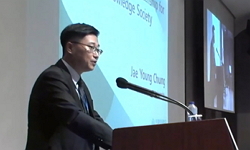Since the enactment of the Social Enterprise Promotion Act in 2007, Korea’s social economy has developed and evolved, centering on the institutionalized sector. Along with Moon Jae-in administration’s social economy revitalization policy, various ...
http://chineseinput.net/에서 pinyin(병음)방식으로 중국어를 변환할 수 있습니다.
변환된 중국어를 복사하여 사용하시면 됩니다.
- 中文 을 입력하시려면 zhongwen을 입력하시고 space를누르시면됩니다.
- 北京 을 입력하시려면 beijing을 입력하시고 space를 누르시면 됩니다.
https://www.riss.kr/link?id=A108661475
-
저자
송원근 (경상국립대학교)

- 발행기관
- 학술지명
- 권호사항
-
발행연도
2023
-
작성언어
Korean
-
주제어
Social Economy 3.0 ; Community Failure ; Locality ; Citizenship ; Sustainability Crise ; 사회적경제 3.0 ; 공동체의 실패 ; 지역성 ; 시민성 ; 지속가능위기
-
등재정보
KCI등재
-
자료형태
학술저널
- 발행기관 URL
-
수록면
27-52(26쪽)
- 제공처
-
0
상세조회 -
0
다운로드
부가정보
다국어 초록 (Multilingual Abstract)
From the viewpoint of ‘recovery of citizenship in the social economy,’ this article shows that the free market destroys the balance between community, state, and market and collapses the basis of locality by suppressing sociality and subjecting it to market transactions. As a result, it is confirmed that citizenship, the foundation of capitalism, has been weakened. The stage of social economy development that can respond to the sustainability crisis while restoring lost sociality, overcoming the crisis of relationships, and recovering citizenship based on the recovery of community and locality can be called ‘Social Economy 3.0’. This ‘Social Economy 3.0’ is a mutual and simultaneous process in which empathy and support for the social economy spread. Only through this restorative process can the social economy evolve from the periphery to the social and solidarity economy from the informal to the formal economy.
Since the enactment of the Social Enterprise Promotion Act in 2007, Korea’s social economy has developed and evolved, centering on the institutionalized sector. Along with Moon Jae-in administration’s social economy revitalization policy, various regional strategies or business models based on the social economy have emerged. In addition, awareness of the need to create and strengthen the social economy ecosystem has increased. On the other hand, there is criticism that there is no long-term prospect in a state without enough consensus on the social economy.
From the viewpoint of ‘recovery of citizenship in the social economy,’ this article shows that the free market destroys the balance between community, state, and market and collapses the basis of locality by suppressing sociality and subjecting it to market transactions. As a result, it is confirmed that citizenship, the foundation of capitalism, has been weakened. The stage of social economy development that can respond to the sustainability crisis while restoring lost sociality, overcoming the crisis of relationships, and recovering citizenship based on the recovery of community and locality can be called ‘Social Economy 3.0’. This ‘Social Economy 3.0’ is a mutual and simultaneous process in which empathy and support for the social economy spread. Only through this restorative process can the social economy evolve from the periphery to the social and solidarity economy from the informal to the formal economy.
국문 초록 (Abstract)
이 논문은 ‘사회적경제의 시민권 회복’이라는 관점에서 자유시장이 사회를 억압하고 시장거래의지배하에 두어 공동체-국가-시장의 균형과 지역성의 토대를 파괴하였음을 보이고자 한다. 그 결과자본주의 존립 기반인 시민권이 약화되었음을 확인한다. 상실한 사회성을 복원하고, 관계의 위기를극복하며, 공동체와 지역성 회복을 바탕으로 시민권을 회복하면서, 지속가능성 위기에도 대응할 수있는 사회적경제 발전 단계를 ‘사회적경제 3.0’이라고 부를 수 있다. 이 ‘사회적경제 3.0’은 사회적경제에 대한 공감과 지지가 확산되는 상호적 과정이자 동시적 과정이다. 이 회복적 과정을 통해서만 사회적경제가 주변에서 벗어나 사회연대경제로, 비공식경제에서 공식경제로 진화해 갈 수 있을것이다.
2007년 사회적기업육성법 제정 이후 우리나라 사회적경제는 제도화된 부문을 중심으로 발전・진화하고 있다. 문재인 정부의 ‘사회적경제 활성화’ 정책과 함께 사회적경제를 기반으로 한 ...
2007년 사회적기업육성법 제정 이후 우리나라 사회적경제는 제도화된 부문을 중심으로 발전・진화하고 있다. 문재인 정부의 ‘사회적경제 활성화’ 정책과 함께 사회적경제를 기반으로 한 다양한 지역 전략이나 비즈니스 모델이 등장했다. 또 사회적경제 생태계 조성과 강화 필요성에 대한 인식도높아졌다. 반면 사회적경제에 대한 공감대가 충분하지 않은 상태에서 장기적 전망이 없다는 비판도있다.
이 논문은 ‘사회적경제의 시민권 회복’이라는 관점에서 자유시장이 사회를 억압하고 시장거래의지배하에 두어 공동체-국가-시장의 균형과 지역성의 토대를 파괴하였음을 보이고자 한다. 그 결과자본주의 존립 기반인 시민권이 약화되었음을 확인한다. 상실한 사회성을 복원하고, 관계의 위기를극복하며, 공동체와 지역성 회복을 바탕으로 시민권을 회복하면서, 지속가능성 위기에도 대응할 수있는 사회적경제 발전 단계를 ‘사회적경제 3.0’이라고 부를 수 있다. 이 ‘사회적경제 3.0’은 사회적경제에 대한 공감과 지지가 확산되는 상호적 과정이자 동시적 과정이다. 이 회복적 과정을 통해서만 사회적경제가 주변에서 벗어나 사회연대경제로, 비공식경제에서 공식경제로 진화해 갈 수 있을것이다.
동일학술지(권/호) 다른 논문
-
- 한국협동조합학회
- 박현수
- 2023
- KCI등재
-
사회적경제 참여 의도의 영향요인 규명: 인식과 참여 경험을 중심으로
- 한국협동조합학회
- 유한나
- 2023
- KCI등재
-
- 한국협동조합학회
- 전지윤
- 2023
- KCI등재
-
디지털시대 협동조합 법제의 미래방향: 협동조합의 정체성 강화와 조합원의 사업이용 관점에서
- 한국협동조합학회
- 송재일
- 2023
- KCI등재





 KCI
KCI KISS
KISS






